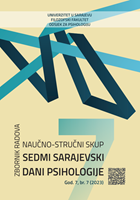Processing of unaccusative structures in people with aphasia and healthy population
Processing of unaccusative structures in people with aphasia and healthy population
Author(s): Nermina ČordalijaSubject(s): Psycholinguistics, Individual Psychology, Cognitive Psychology, Neuropsychology, Clinical psychology, Health and medicine and law
Published by: Filozofski fakultet Univerziteta u Sarajevu
Keywords: unaccusativity; filler-gap dependencies; argument structure; working memory; perfective aspect;
Summary/Abstract: This paper provides an overview of several studies that investigated processing of unaccusative structures in populations of people with aphasia (PWA) and healthy speakers. Unaccusative structures are known to be notoriously difficult for patients with Broca’s aphasia. In the paper, we address seminal works that proposed The Argument Structure Complexity Hypothesis and The Derived Order Problem Hypothesis to account for the deficits that occur in the production of unaccusative structures in Broca’s aphasia that is characterised by slow and effortful speech. We also refer to studies that explored processing of unaccusative structures in healthy populations. These studies reveal that the moved unaccusative subject is stored in the working memory until the parser reaches the sentence position where the unaccusative argument was merged and then it is reconstructed at that position. We also address the interplay between unaccusativity and the category of aspect that was investigated in some experimental studies. Finally, the paper provides directions for future research in L1 and L2 processing to build upon the state of the art on unaccusativity.
Journal: SARAJEVSKI DANI PSIHOLOGIJE: ZBORNIK RADOVA
- Issue Year: 7/2023
- Issue No: 7
- Page Range: 251-269
- Page Count: 19
- Language: English

